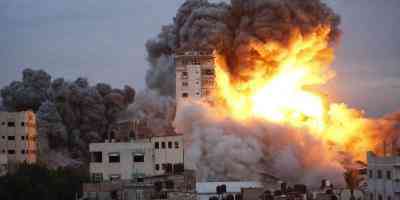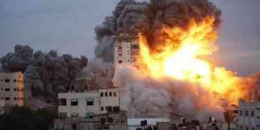Why War?
Hamas, an Islamist organization that is dedicated to destroying Israel and is listed as a terrorist organization by the UK and many other nations, is in charge of Gaza.
The last elections held in the Palestinian territories were won by Hamas in 2006, and the movement overthrew President Mahmoud Abbas's rival Fatah movement to take over Gaza the following year.
Since then, Israel and Egypt have maintained a partial embargo on the Gaza Strip in an effort to isolate Hamas and put an end to attacks, especially the random firing of rockets against Israeli cities. This has resulted in multiple wars between militants in Gaza and Israel. Gaza's Palestinian population claims that Israel's airstrikes and restrictions on densely populated areas are collective punishment.
For Palestinians in the occupied West Bank and East Jerusalem, this year has been the deadliest on record. They also take issue with the limitations and military operations that are implemented there in reaction to fatal Israeli attacks. These tensions may have been behind the most recent attack by Hamas.
Furthermore, it's also possible that the militants wanted to increase their support among regular Palestinians. One possible tactic would have been to use hostages as leverage to get Israel to release some of the 4,500 Palestinians that are said to be detained in its jail.
The violence between Palestinians and Israelis on Israel's streets is another factor contributing to this escalation that hasn't been present previously. It's uncertain if all of this violence would stop with a truce with Gaza. However, carrying out the coastal strip bombardment will probably not stop fuelling the nation's internal unrest. Israel is forced to choose between seeing its social fabric fall apart more quickly or pursuing a truce sooner than it would have liked.
In general, Israel must to condemn acts of violence and hate speech, regardless of their origin, and administer fair and unbiased punishment to everyone. Israeli policymakers bear a special obligation to counteract ethnic prejudice that comes from the Jewish extreme right and to ensure that Palestinian residents receive the same protection from civilian and police violence as Jewish citizens. Leaders of the Palestinian community in Israel have a similar responsibility inside their respective communities.
Of Course There Will Be the Impact
Despite Gaza being one of the most economically disadvantaged locations in the world, the developing tech and startup economy in Palestine has been completely destroyed by the Israel-Hamas war. Several highly regarded startups have emerged from Gaza.
In light of its booming technology ecosystem, which supports a strong startup culture and a sizable IT economy, Israel is frequently referred to as the "Startup Nation." The country has a long history of technological innovation and has witnessed the emergence of many prosperous businesses inside its boundaries. This innovative climate spans multiple industries, such as artificial intelligence and cyber security, and greatly enhances Israel's standing as a center for cutting-edge technology.
The Israeli tech industry has been impacted by the conflict between Israel and Hamas, as the reservist call-up has resulted in a reduction in staff at tech businesses. The impact of the war on the tech sector is currently minimal, but if it continues to spread, that might change.
There are 6,000 active tech startups in Israel alone, while big American corporations like Intel, Microsoft, Google, Apple, Meta, IBM, Cisco, and many more invest heavily in research and development. Businesses are being negatively impacted by the conflict between Israel and Hamas. After an employee and a retiree of IBM died, IBM denounced the Hamas attacks on Israel.
American businesses are making investments in the Middle East, particularly in cloud providers, in nations including Egypt, Saudi Arabia, Qatar, and the United Arab Emirates. stated Joshi. In fact, $5 billion will be invested in the region over the next 15 years by Amazon Web Services, which established the AWS Middle East (UAE) Region last year. In May, Google opened a new cloud region in Qatar.
Politically motivated hackers started targeting corporate websites after Hamas attacked Israel on 7th October. Following the Hamas strike, a string of cyber-attack brought down the English-language publication The Jerusalem Post, which was headquartered in Jerusalem.
It can be pointed out that conflict between Israel and Palestine can gain many effect especially for the tech sector. Here are the following of the effects on the tech sector:
1. As the dispute intensifies, it has an impact on the climate in which digital businesses function. The growth of these firms may be impacted by investors growing wary of funding businesses in an unstable region and talent looking for opportunities outside. The persistent fear of violence might interfere with day-to-day operations and make it difficult to keep a productive workplace.
2. Cyber-attacks are also more likely as a result of the conflict. In tense situations, both sides have been known to launch cyber-attacks against one another's vital institutions and businesses. Because of this, companies and governmental organizations in the area must allocate more funds to cyber-security, taking funds away from other IT projects. Global businesses and organizations that depend on Israeli technology services and expertise may be impacted by this.
3. Lost connection
There are about 100 software engineers employed by Manara in Gaza; some of them work remotely for Silicon Valley tech corporations in the US and Europe. Most people only have partial access to 2G on their cell phones, or they have entirely lost their internet and cell phone connections.
4. Disruption of IT operations
Physical damage to IT infrastructure, including data center and communication networks, may result from the battle. Additionally, it may interfere with transportation and power supplies, making it more difficult for businesses to run their IT systems and for IT professionals to commute to work.
5. Loss of talent
Because IT workers may be called up for military duty or leave the nation, the conflict may result in a loss of talent in the IT sector.
It can be concluded that the Israeli-Palestinian conflict has a significant impact on the worldwide IT sector. Its influence is evident in everything from supply chains and global cooperation to startups and cyber security. The industry needs to be alert and flexible as we watch this complicated situation continue to evolve in order to guarantee that innovation will continue to flow despite obstacles.
Baca konten-konten menarik Kompasiana langsung dari smartphone kamu. Follow channel WhatsApp Kompasiana sekarang di sini: https://whatsapp.com/channel/0029VaYjYaL4Spk7WflFYJ2H







